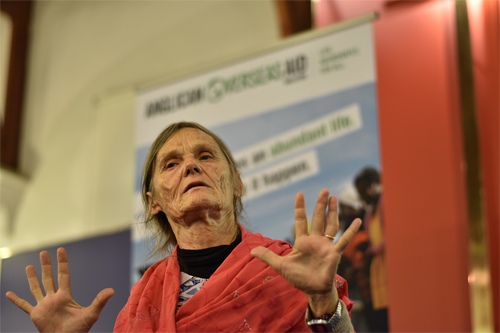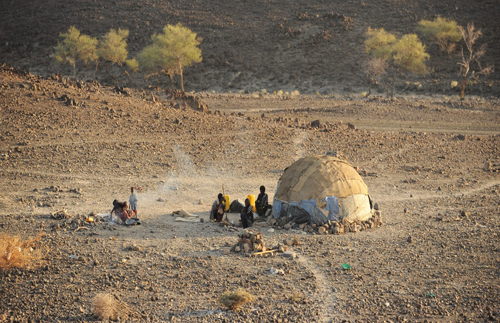
DAVID ADAMS talks to Australian nurse Valerie Browning, in Australia to touch base with supporters like Anglican Overseas Aid, about her remarkable life among the Afar people of northern Ethiopia and the difference the organisation she helped found – the Afar Pastoralist Development Association – is making to their lives…
Valerie Browning reckons she learned many lessons from the Afar people during almost 30 years she has spent living among them in northern Ethiopia – key among them is their sense of caring for the Earth – and each other.
“People believe all the time in using, using, using, using,” says the 67-year-old during an interview with Sight while visiting the offices of Anglican Overseas Aid in Melbourne recently. “[The] Afar have a sense of a plan which is look at what your using, let the resource you are using remain – [which means] you may have to hold off and not use it for a while so that it continues, it revives and goes on. So they’re great ecologists.”
Ms Browning describes their sense of community and caring for each other as “magnificent” and contrasts it with the growing sense of individualism seen in Western cultures.


LIFE IN A DISTANT LAND: Top – Valerie Browning, speaking at a recent Anglican Overseas Aid event in Melbourne; and below – an Afar family and their home. PICTURES: Courtesy Anglican Overseas Aid.
“People get into trouble, yes, but it becomes something we solve together…The community go through it together…All the Gospel stories, all the stories about people in the Old Testament are about people moving together. They might have done other things but eventually they have a solution together. It’s like that.”
– Valerie Browning, speaking about life among the Afar people.
“People get into trouble, yes, but it becomes something we solve together…The community go through it together…All the Gospel stories, all the stories about people in the Old Testament are about people moving together. They might have done other things but eventually they have a solution together. It’s like that.”
Ms Browning’s story – told in the 2008 memoir Maalika: My Life among the Afar Nomads of Africa (the word ‘maalika’ means ‘queen’ in Arabic) – is nothing short of remarkable.
Born in England as one of eight children (her brother George went on to become the ninth Anglican bishop of Canberra and Goulburn), she spent her teenage years in regional New South Wales, she first went to Africa with a friend, Rowene Brooker, in 1973. In their early 20s, they’d only recently completed their nursing training when they volunteered to help in the response to a devastating famine then taking place in Ethiopia.
It was to be the first of many trips to the African continent (coming back to Australia to earn money before returning again to countries, as well as Ethiopia, including Sudan, Somalia and Djibouti) before in 1989 she met her husband Ismael Ali Gardo and settled with him among his people – the nomadic Afar people who live over an area encompassing Djibouti, northern Ethiopia and Eritrea.
Located at the head of Africa’s famous Rift Valley, it’s a region known for high temperatures – they can exceed 50 degrees Celsius during summer – and its aridity, but Ms Browning doesn’t hesitate when describing the area where she lives in north-eastern Ethiopia as “beautiful”.
“You’ve got very arid land, you’ve got literal desert, you’ve got a little bit of forest land, you’ve got grasslands – there’s all sorts of areas inside of Afar,” she says, adding that it’s also home to one of a handful of always active volcanoes in the world – Erta Ale. “It’s actually a very beautiful place.”
Living among the Afar (who officially number 1.6 million but whom Ms Browning believes could actually account for more than two million of Ethiopia’s more than 100 million population), Ms Browning soon saw their need for help in areas like maternal health and the spread of disease.
So, in 1994, she and Ismael, together with a group of Afar men, established the Afar Pastoralist Development Association with the aim of developing a model of assistance which enabled the Afar people to have the benefits of healthcare, education and a sustainable economy while still maintaining their culture and nomadic lifestyle.
“When we started, they were two per cent literate, they had no vaccinations, there was certainly no maternal health care – there was no healthcare, in fact,” recalls Ms Browning.
“And so a model had to come about that [meant] these people didn’t have to leave their lifestyle and yet could be under health[care] and education…”
While there remain many challenges – Ms Browning recounts how she was recently involved in helped to get water to some 61,000 people in grave danger of dying of thirst while the massive reduction in the Afar herd of goats in 2012 thanks to drought remains a major concern, the changes that have taken place since the formation of APDA have been significant.
The literacy rate has grown to about 15 per cent among women and 26 per cent among men as access to education has increased and healthcare, including childhood vaccination programs, has been taken to even the most remote areas (the vaccines have at times been carried inside ice-filled insulated containers sitting on the backs of camels) while maternal health has been improved through measures such as the establishment of a small hospital for emergency obstetrics.
In addition, a banking system has been developed, new roads built and, importantly, access to limited water resources improved. APDA even recently launched its own FM radio station – a “great tool”, says Ms Browning on which to broadcast development-related messages.
“I do think things are happening – they may not be happening at the speed some body else thinks they should be done, but they are happening,” says Ms Browning . “And the important thing is the changes are being made by the community themselves.”
Having the community spearhead the development has been a critical part of APDA’s approach from its inception, investing in training local people – whether as healthcare workers, teachers or community development workers – so they can become what Ms Browning calls the “agents of change”.
APDA’s partnership with other organisations, like Anglican Overseas Aid with whom APDA recently partnered in an Australian Government-funded project to improve nutrition and maternal and child health through the provision of better access to community-based health services, has also been key to providing funds for their work.
“It’s an essential partnership,” says Ms Browning. “Because, as it was, APDA could not access resources to do anything. Those who give their life as health workers, as teachers, as woman extension workers – they need to live, and their need is so extreme.
“So APDA absolutely depends on and needs its partnerships from countries like Australia, for organisations like Anglican Overseas Aid. This is very important because with those sorts of partnerships we can discuss meaningfully what we’re doing in terms of impact, the way forward and see the thing done properly…”
Ms Browning, who has three children – a daughter Aisha, 26, who works as a nurse in Sydney and two sons, Rammid, 15, and Nabil, three, both of whom live in Ethiopia, says her Christian faith has played a vital role in not only initially leading her to work in the area but in her ongoing role there.
“If I didn’t have a faith, I wouldn’t be there, I don’t think…” she says, adding that her faith in God is also key to the way in which she responds to the many challenges she encounters in her life.
“If I think that the problem I’m facing is my problem, then I am lost because I don’t have a solution. If I believe that God has got this problem already worked out and I’m just on the track of doing something, then I can continue,” she says.
“Don’t have a cupboard for yourself and a cupboard for God. That’s nonsense. I’ve done that part of my life and I don’t think that’s a good idea. You’ve got to believe that God should be part of every section of your life, every decision you make.”
– Valerie Browning
And while she lives among Muslim people – her husband Ismael is a Muslim, she says she’s always found the Afar people to be “extraordinarily respectful” towards her faith.
“The more they get to know you as a person, they more they want to get into a discussion…[about] all the parts of the Bible, they want to discuss the person Jesus, they want to discuss the Second Coming – everything. So, I mean, we have great discussions.”
Asked what advice she would give her fellow Christians who may be contemplating how they live a fuller life in God, she says: “I would say to any Christian as I say to myself – ‘Don’t cheat God, commit everything you’ve got to God’. “
“Don’t have a cupboard for yourself and a cupboard for God. That’s nonsense. I’ve done that part of my life and I don’t think that’s a good idea. You’ve got to believe that God should be part of every section of your life, every decision you make. It’s not your decision at the end of the day.
“And enjoy, for Heaven’s sake. I don’t know about these very serious Christian people…I couldn’t live without a sense of humour, never. Never, never, never. I’m in for a joke – a few every day…I think God has an amazing sense of humour actually.”
Ms Browning, who dismisses talk of retirement – “It’s not a word in Afar – this is nonsense”, says she’s been richly blessed in her life with the Afar people. Having experienced life in the West again, she’s really not sure she could ever return to a place like Australia and live what she calls a “restricted, Western urban life”.
“While one is undeserving in the life one gets, I think I’m very spoilt, very privileged and I think God has been amazingly good to me. I don’t know why, but there you go. All I know, all I’ve experienced is an absolute privilege and it brings me daily joy to see…things happening for the better.”
Head to Anglican Overseas Aid to support the work of APDA in northern Ethiopia.
The precede to this article originally referred to the Afar Pastorialist Development Organisation – that has been corrected to the Afar Pastorialist Development Association. Our apologies for the error.





